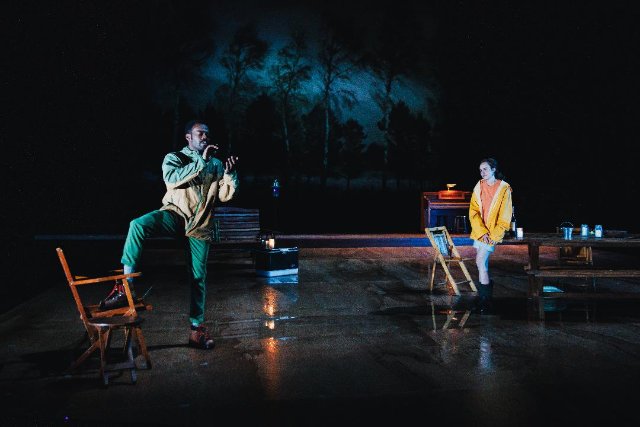Lost in Translation: Heidi Schreck's Uncle Vanya
Lacks Emotional Punch at Lincoln Center’s Vivian Beaumont Theater
By: Jessica Robinson - Apr 30, 2024
“I don’t do anything except sit around on my ass and complain like an old fart,” grumbles Uncle Vanya in playwright and translator Heidi Schreck’s revival of Chekov’s classic play, currently at Lincoln Center.
Whereas Chekhov's 1897 masterpiece balanced humor and pathos, this modernized rendition prioritizes laughs over hard-hitting emotion. Schreck’s interpretation charms audiences with its humor....up to a point. Her Vanya, the titular ‘hero,’ may be amusing, but he lacks heroic dimension.
While modern interpretations can breathe new life into classic works, this adaptation tones down the characters’ emotional intensity, thus diluting Chekov’s profound exploration of human relationships.
The play unfolds against the backdrop of vast, down-at-the-heels, country estate, where a tangled web of unrequited love, ennui, and existential angst ensnares its characters in a vortex of longing and dissatisfaction.
Vanya, played by Steve Carell, (“The Office”), is a bitter, aging man who feels he has wasted his life toiling on the estate of his pompous, egotistical, brother-in-law, (Alfred Molina), referred to as the Professor. The ailing Professor has retired and come to live in the dilapidated house that Vanya, with the help of his niece, the Professor’s unmarried daughter, Sonia, has struggled to keep going for the past 25 years.
“Ever since the Professor showed up with his spouse, my life has been total chaos,” laments Vanya, who is consumed with resentment towards his brother-in-law: “He’s a nothing! A soap bubble! He conned me.” Vanya is also deeply jealous of the Professor’s much younger, beautiful, wife, Elena, (Anika Noni Rose), with whom he falls in love. She, on the other hand, barely acknowledges his meager existence.
Adding to the chaos is the frequent presence of the neighbor, Dr. Astrov, (William Jackson Harper, the most interesting and fully developed character in the play). He is a complex man who shares Vanya’s love of booze and Elena.
While Vanya’s existence revolves around managing a meager estate to support his brother-in-law’s extravagant urban lifestyle, Astrov is burdened by the weight of his own responsibilities as a physician and environmentalist: “Astonishing landscapes are disappearing from memory,” he laments, “all because we’re too cynical to do anything to stop it!”
Astrov’s tireless efforts to protect the environment serve as both a noble crusade and a desperate attempt to find purpose in a world he perceives as increasingly devoid of meaning.
Similar to Vanya’s unrequited love for Elena, Astrov’s encounters with the Professor’s alluring young wife awaken dormant desires, further complicating his already tumultuous emotional landscape.
Meanwhile, Sonia pines silently for the handsome, hard-drinking Astrov, who remains oblivious to her affections.
In contrast to the heartfelt portrayal of Sonia’s yearning for Astrov in most other productions, this adaption fails to fully capture the depth of her anguish and loneliness, detracting from the audience’s ability to empathize with her.
If things on the farm weren’t bad enough, the Professor’s life isn’t going well either. He has money problems. When he proposes to sell the farm and buy a cottage in Finland, Vanya’s emotions begin to simmer, and, eventually boil over. He rants and raves about having spent the best years of his life working the land for the Professor’s benefit, and then storms out of the room. Elena and the Professor both go after him. Suddenly a shot is heard off-stage. The Professor runs onto the stage and Vanya fires a second shot, twice missing him.
This dramatic moment underscores the depths of Vanya’s anguish and the extent of his resentment. The gun symbolizes Vanya’s desperation and his desire to assert control over his life. Dejected, Vanya tosses the revolver to the ground and sinks into a chair.
In the final act we learn that Elena and the Professor have decided to return to the city. Dreading the empty years to come, Vanya pleads with Astrov to help him start a new life. Astrov’s response offers no solace. The provinces have sapped him of hope: “Life out here...it’s stupid, boring, dirty….it chews you up….No new life is coming, not for us. Our situation is hopeless.”
Chekov’s exploration of environmental decay, the plight of overburdened and underappreciated healthcare workers, and the suffocating sense of being trapped in one’s own life, rings as true today as ever.
In his original work, the narrative delved deeply into these complex themes, illuminating the struggles of his ordinary characters who constantly bemoaned the hands that they were dealt.
Unfortunately, Lincoln Center’s light-weight Vanya does not delve deep enough.
Uncle Vanya: Beaumont Theater, Manhattan, through June 16.
Directed by Lila Neugebauer
Sets by Mimi Lien and costumes by Kay Voyce
Photo credits: Marc J. Franklin|
Running time: 2 hours 25 minutes


